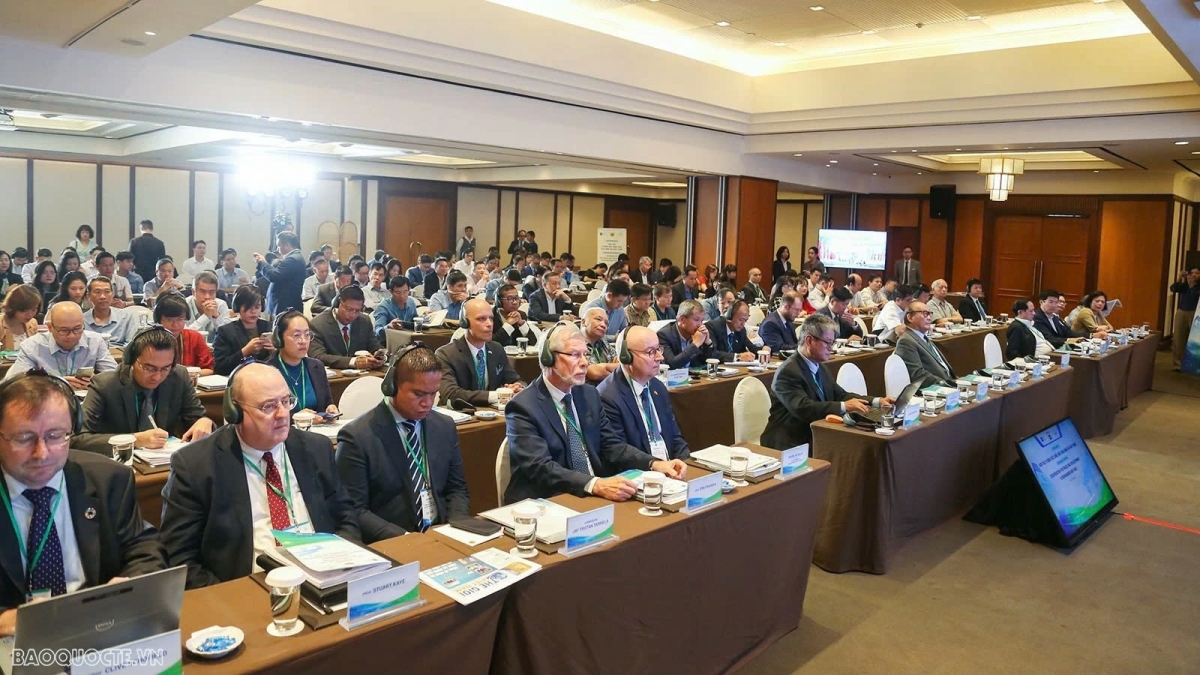Int’l workshop examines cooperation for peace and development in boundaries and seas
VOV.VN - The Ministry of Foreign Affairs, in collaboration with the Wallonie-Brussels Delegation to Vietnam, organized an international workshop titled “Cooperation for Peace and Development in Boundaries and Seas” in Hanoi on October 8.

In his opening remarks, Deputy Minister of Foreign Affairs of Vietnam Nguyen Minh Vu noted that borders, both on land and at sea, define the living space and development of nations, while also reflecting their sovereignty, sovereign rights, and jurisdiction under international law. Therefore, clearly delineating borders and managing cooperation effectively based on the provisions of international law is a key factor in ensuring peace, stability, and sustainable development, as well as building long-lasting friendly relations between the involved nations.
In the current context, he stressed, many traditional and non-traditional security challenges are emerging, posing significant threats to the international order and the common interests of numerous nations and the international community as a whole.
“We must not only confront disputes over territorial and maritime sovereignty, along with the complex and concerning developments stemming from these disputes, but also address various non-traditional challenges such as climate change, marine pollution, resource depletion, and transnational crime,” said Vu, adding these issues not only impact the security and sustainable development of each nation but also security and development regionally and globally.
According to the diplomat, Vietnam, that has more than 5,000 km of land borders and 3,260 km of coastline, clearly recognizes the significance, necessity, and demand for international cooperation on maritime and territorial borders. So far, it has completed the demarcation and border marker planting with China and Laos. It has also accomplished 84% of the workload along the land border with Cambodia.
At sea, Vietnam has successfully negotiated and signed several agreements on maritime delimitation with neighboring countries, such as Thailand, China and Indonesia. It is also collaborating on border issues with many countries both within and outside the region to maintain peace, stability, and development, ensure freedom of navigation and overflight, and to address non-traditional maritime security challenges in the East Sea known internationally as the South China Sea.
In his view, the East Sea, with its strategic importance for both economic and security reasons, is currently at the center of many significant challenges related to traditional and non-traditional security.
To address these challenges, international law, particularly the 1982 United Nations Convention on the Law of the Sea (UNCLOS), plays an extremely important role as a comprehensive and universal legal framework for all activities at sea and in the oceans. UNCLOS is not only a practical tool that helps countries delineate maritime boundaries and peacefully resolve disputes, but it also provides a solid foundation for international cooperation in maritime activities.
Vietnam is committed to respecting and applying the provisions of UNCLOS to address maritime issues, and work alongside the international community to protect and uphold an international legal order at sea and in the oceans, stated Vu.
Taking the floor, Pierre Du Ville, head of the Wallonie-Brussels Delegation to Vietnam, stated that the workshop is part of a cooperation project aimed at enhancing capacity among partners in the field of border delimitation and management.
He held that the East Sea, a strategic crossroads of Southeast Asia, has been a focal point of Vietnam’s interests for centuries, and its important geostrategic role continues to grow, becoming a significant issue for the entire region.
The EU diplomat welcomed Vietnam’s role as a model for prioritizing diplomatic measures and bilateral dialogue with neighboring countries, as well as actively participating in regional forums, particularly within ASEAN, to promote the peaceful resolution of disputes.
By undertaking this project, Du Ville expected to make a small contribution to finding solutions and wishes to maintain an effective partnership between the National Boundary Commission and the Free University of Brussels (VUB).


